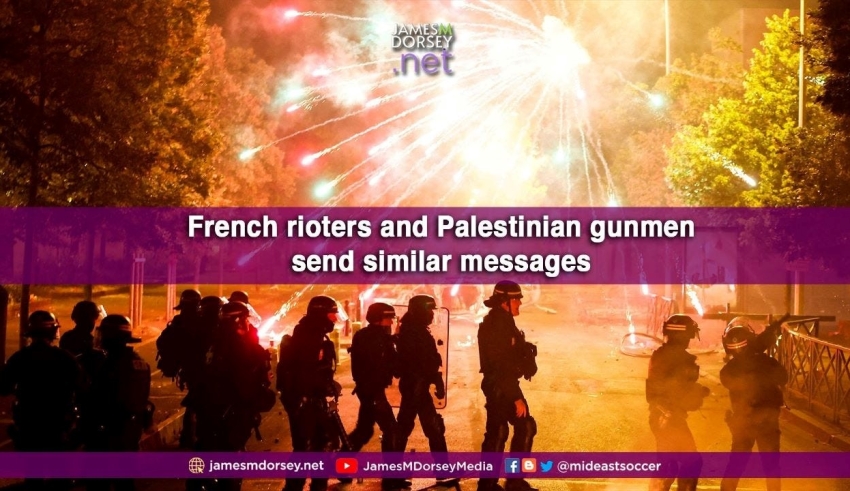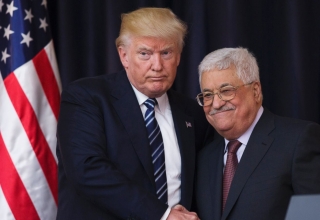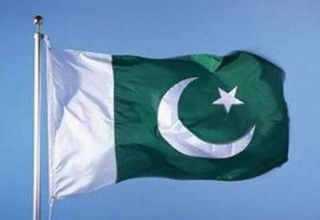
By Dr. James M. Dorsey |
At first, comparing Palestinian gunmen in the Israeli-occupied West Bank to rioting youth in France may resemble likening apples to pears.
In many ways, it is.
Youth in France are full-fledged French citizens demanding an end to disenfranchisement, marginalisation, alienation, racism and law enforcement and security force brutality.
That is where Palestinians would like to be after 56 years of occupation with no prospect for independence or integration into Israel with the kind of rights accorded to all, irrespective of ethnicity or religion, by French law, even if reality in France offers a different picture.
Yet, armed Palestinian resistance and French rioting have a common message: violence results from governmental and societal failure to acknowledge and address social, economic, political, and/or national aspirations.
Palestinian fighters and French rioters signal that violence will recur and likely escalate as long as governments reduce structural defaults to a law enforcement, security, and terrorism issue.
The difference between France and Israel is that French President Emmanuel Macron acknowledges the underlying problems, while Israeli Prime Minister Binyamin Netanyahu sees force, repression, and intimidation as the way to disappear problems, and bend Palestinians to his will.
Both Messrs. Macron and Netanyahu are driven as much by a political vision as politics and a perceived need to cater to the right, far-right, and ethnic and religious prejudices.
Mr. Macron has promised to investigate what led to the police shooting last month of 17-year-old Nahel Merzouk during a traffic stop in the Paris suburb of Nanterre.
The June 27 killing sparked six days of riots across France, with protesters looting shops, setting cars alight, destroying bus stops, and pelting police with fireworks that wounded some 200 law enforcement officers.
France needs “order, calm, unity. And then to work on the deep causes of what happened,” Mr. Macron said.
Mr. Macron is not the first French leader to promise to tackle the violent protest’s root causes.
“Manuel Valls, a former prime minister, said these complexes instilled a sense of ‘territorial, social and ethnic apartheid’. Growing up on one, we were forever defined as failures by our postcode. Authority figures from teachers to police officers perpetuated a generational cycle of mediocrity and humiliation,” said Nabila Ramadani, a French woman of Algerian descent. Ms. Ramadani was referring to banlieues or ghetto-like suburbs of French cities.
Like his predecessors, Mr. Macron will likely discover that failure to follow through on promises means problems will fester and deepen societal divides.
Even so, so far, Mr. Macron’s words appear to be little more than sweet talk.
He seems more concerned about stymieing far-right efforts to capitalise on its anti-immigrant and strong law enforcement messaging, even if he is likely to take heart from a poll carried out during last week’s riots that showed his highest approval rating since March at 33 per cent.
As a result, the first legislative response to the riots was a law enforcement bill passed by parliament that activists charge threatens to curb democratic freedoms and oversight of the police.
The bill allows police to secretly access suspects’ cameras, microphones, and location via their mobile phones and employ surveillance drones.
It also criminalises helping to identify on-duty police officers with “obvious” harmful intent, punishable by up to five years in prison and an US$89,800 fine.
In addition, authorities are fast-tracking legal proceedings against some 3,600 detained protesters with an average age of 17.
French courts are working overtime to process the arrests, including opening their doors on weekends, with fast-track hearings around an hour long and same-day sentencing.
“Like other authoritarians, France expands the reach, capabilities and competences of its law enforcement instead of addressing the root causes of failed integration policies,” tweeted scholar Andreas Krieg.
In contrast to Mr. Macron, Mr. Netanyahu and his government, the most ultra-nationalist and ultra-conservative religious cabinet in Israeli history, refuse to acknowledge that they face existential issues that extend far beyond the prime minister’s assertion of terrorism.
Speaking to an Israeli parliament committee days before Israel launched a massive military assault on a refugee camp in the West Bank town of Jenin, a hotbed of Palestinian militancy, Mr. Netanyahu asserted that the Jewish state “needs to crush (the Palestinian) ambition” for an independent state.
Mr. Netanyahu vowed, “The extensive operation in Jenin is not a one-off. We will not allow Jenin to go back to being a city of refuge for terrorism.”
Israeli forces this week launched their largest-scale military operation in Jenin in decades, killing at least 12 Palestinians, wounding scores of others, and leaving widespread destruction across the refugee camp.
Days later, two members of the Popular Front for the Liberation of Palestine (PFLP) were killed in the West Bank town of Nabulus in a gunfight with Israeli troops.
Rather than focus on the existential issues confronting both Israelis and Palestinians, liberal Israeli commentators highlighted the domestic political aspects of the Israeli assault.
Respected columnist Zvi Bar’el titled one of his latest Haaretz columns, ‘Netanyahu’s Jenin Op Was a Sedative for the Settlers.’
Mr. Bar’el was referring to Israeli vigilante attacks against Palestinians in response to Palestinian assaults on Israelis.
Like the French riots, the worst since mass protests in 2005, the latest bout of Israeli-Palestinian violence demonstrates that 56 years of harsh occupation, punitive attempts to squash Palestinian resistance and aspirations, and settlement activity aimed at changing the West Bank’s demographics have failed.
Israel, like France, confronts a festering wound that will not be healed or go away by applying band-aids, ignoring the problem’s existence, or using a sledgehammer.
If anything, the wound will continue to fester.
The problem may be very different in Israel and France, and so is the solution.
However, in both cases, the solution is political rather than coercive. There is no reason to believe that Israel or France has the political will to tackle the violence’s root causes. Without that, there is little not much, if any, at the end of the tunnel.
Dr. James M. Dorsey is an award-winning journalist and scholar, an Adjunct Senior Fellow at Nanyang Technological University’s S. Rajaratnam School of International Studies, and the author of the syndicated column and podcast, The Turbulent World with James M. Dorsey.








